希特勒的英文简介
希特勒的英文简介
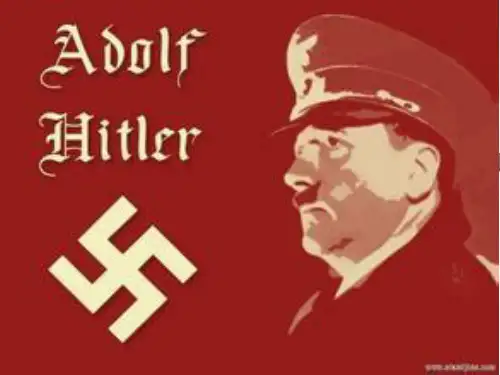
He
quickly took dictatorial powers and began to institute anti-Jewish laws. He also began the process of German militarisation and territorial expansion that would eventually lead to World War Two . He allied with Italy and later Japan to create the Axis(轴心国).
Early years World War I At the outbreak of World War I, Hitler volunteered to serve in the Bavarian(巴伐利亚, 德国) army as an Austrian citizen.
During
and
father
worked in the customs bureau his mother was a
housewife. Hitler had three
siblings(哥哥姐姐) but they all died in infancy(幼年)
希特勒英文版简介
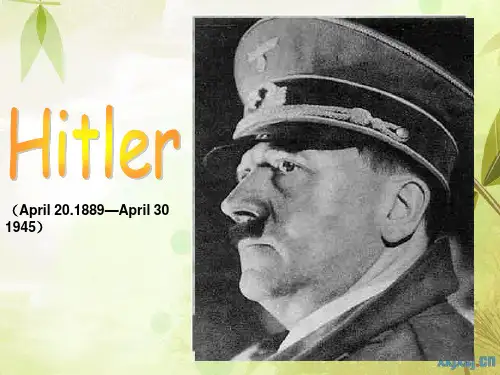
(April 20.1889—April 30 1945)ortant story
effect
1889
1914 1921 1923
been borned in Austria
joined the German army renamed the Labour Party as Nazi Party been sent to prison(munich conspiracy)
4 the United Nations was born .(peace)
proverb:
• 1.I have not come into this world to make men better, but to make use of their weaknesses. 我来到这个世界不是让人们更加完善, 而是来利用他们的弱点的。
Naked body all over the hill and dale .
Nazis is killing the Jews .
the
way to the war
1 In 1938, he began to expand the territory of Germany, the following year ,he sent troops to Austria and the Czech Republic ,invaded Poland, caused World War II and it lasted for nearly five years.
• 2.It `s a weak civilization if it can`t be carried forward and pretected by certain mighty ,and will be conquered by crulty sooner or later. 如果一种文明没有一种强大的力量来发 扬和保护,那么这种文明是脆弱的,迟早 会被野蛮所征服。
介绍希特勒四十英文作文
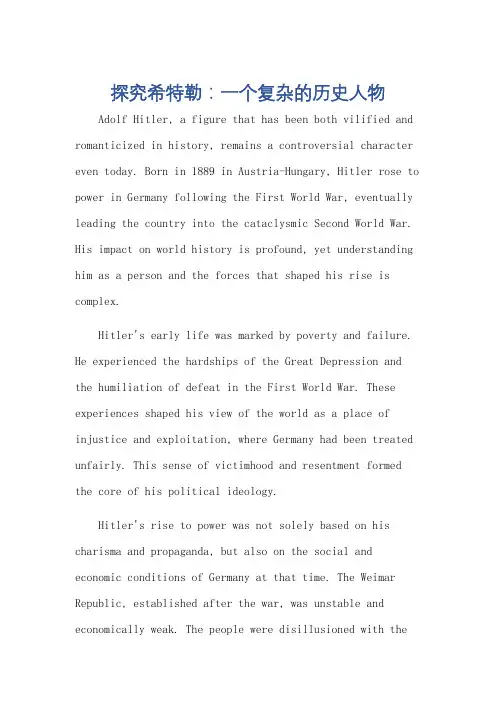
探究希特勒:一个复杂的历史人物Adolf Hitler, a figure that has been both vilified and romanticized in history, remains a controversial character even today. Born in 1889 in Austria-Hungary, Hitler rose to power in Germany following the First World War, eventually leading the country into the cataclysmic Second World War. His impact on world history is profound, yet understanding him as a person and the forces that shaped his rise is complex.Hitler's early life was marked by poverty and failure. He experienced the hardships of the Great Depression and the humiliation of defeat in the First World War. These experiences shaped his view of the world as a place of injustice and exploitation, where Germany had been treated unfairly. This sense of victimhood and resentment formed the core of his political ideology.Hitler's rise to power was not solely based on his charisma and propaganda, but also on the social and economic conditions of Germany at that time. The Weimar Republic, established after the war, was unstable and economically weak. The people were disillusioned with thepolitical class and yearned for strong leadership. Hitler's promise of national rejuvenation and revenge against Germany's enemies resonated with many.His Nazi Party, with its antisemitic and racist rhetoric, capitalized on the fears and anxieties of the German people. Hitler's propaganda machine, led by Joseph Goebbels, used every means possible to spread the Nazi message and create a cult of personality around Hitler himself. The result was a powerful movement that swept Hitler into power in 1933.Once in power, Hitler embarked on a campaign ofnational rejuvenation and expansion. He rebuilt the German economy, rearmed the country, and established atotalitarian state that controlled all aspects of life. His foreign policy was aggressive, seeking to restore Germany's lost territorial gains and influence. This led to the annexation of Austria, the Sudetenland, and ultimately the invasion of Poland that triggered the Second World War.Hitler's leadership style was autocratic and dictatorial. He surrounded himself with loyal followers and purged anyone who challenged his authority. His paranoiaand obsession with power led him to commit atrocities such as the Night of the Long Knives, where he eliminated potential rivals within the Nazi Party, and the systematic murder of millions of Jews, Poles, and other perceived enemies of the Reich.Hitler's impact on world history was profound. His aggressive foreign policy led to the deaths of millions and the destruction of entire nations. His legacy of hate and division has had lasting effects on global politics and society. However, it is important to remember that Hitler was not solely responsible for the horrors of the Second World War. The actions of other leaders, such as Joseph Stalin and Winston Churchill, also played a role.In conclusion, Hitler was a complex figure whose rise to power was influenced by both personal and historical factors. Understanding him requires a nuanced understanding of the social and political context of his time. While his actions and ideologies are deeply immoral and abhorrent, it is important to remember that he was not an isolated figure acting alone. The lessons of history must be learned, andHitler's rise and fall serve as a powerful reminder of the consequences of ignoring the warnings of the past.**探究希特勒:一个复杂的历史人物**阿道夫·希特勒,这位历史人物在世人眼中既被妖魔化又被理想化,即使在今天仍然是一个备受争议的人物。
希特勒介绍英文介绍(英语课前PPT)Adolf_Hitler
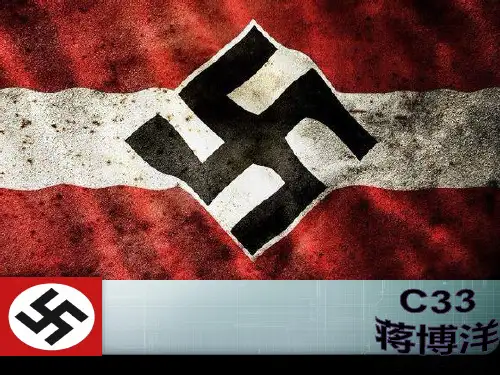
Something Admirable
The great speaker
注:此 处有段 10分钟 希特勒 演讲视 频 http://v. youku. com/v_ show/i d_XND M3OD g0OD Y4.htm l
LOGO
Early years
Hitler's father sudden death on 3 January 1903. On 21 December 1907, his mother died aged 47. After his mother's death. Hitler worked as a casual labourer and eventually as a painter, selling watercolours to support life. During this time,he also pay attention to his concerned politics and read a great number of books on ultranationalism [`ʌltrə`næʃənəlizəm] and AntiSemitism [`semitizəm] .(极端民族主义和反犹主义) In May 1913, Hitler moved to Munich [`mju:nik].(慕 尼黑,德国)
Entry into politics
In 1923,Hitler attempted an unsuccessful armed uprising in Munich and was imprisoned for nine months , during which time he dictated his book My Struggle(我的奋斗) outlining his political ideology. After his release in 1924,Hitler rapidly regained support by promoting Pan-Germanism , anti-semitism ,and anti-communism[`kɔmjunizəm] (日耳曼主义,反犹太 主义和反共产主义) with charismatic [,kærɪz`mætɪk]( 有魅力的) oratory and propaganda [,prɔpə`ɡændə]( 宣传).
希特勒简介
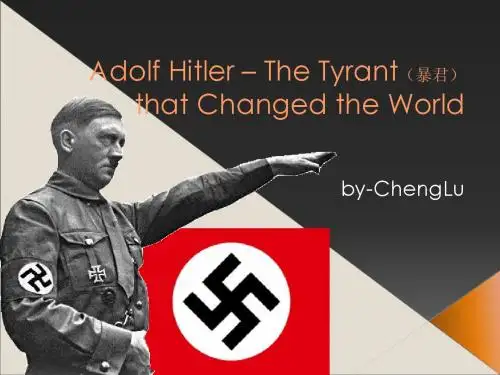
“Service in World War 1 had [provided] comradeship and some accomplishment.” – Chambers (1038)
5
Entrance into Politics
Hitler had been appointed as a spy after the death of the murder of Kurt Eisner(艾斯纳 ), the Bavarian Prime Minister. The German Workers’ Party invites Hitler into the party due to his superior oratory skills(演讲技能).
4
“For anyone who has not taken the time to study the Habsburg monarchy.” – Hitler (13)
World War I
Enlisted(应征入伍) in the Bavarian Regiment(巴格利亚团) at age 25. Always willing to do dangerous missions and never complained about the food or the living conditions. He received several awards for bravery and courage. October 7, 1916 Hitler is injured for the first time. October 15, 1918 Hitler was temporarily blinded by a Mustard Gas attack(芥子毒气袭击).
希特勒英文简介(HitlerEnglishIntroduction)
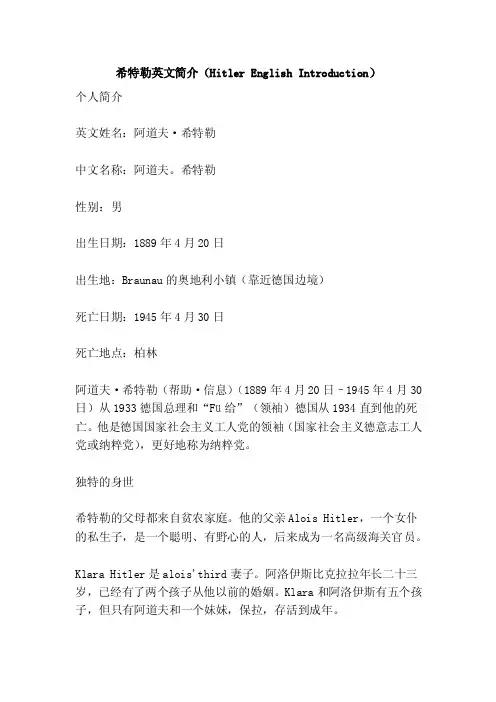
希特勒英文简介(Hitler English Introduction)个人简介英文姓名:阿道夫·希特勒中文名称:阿道夫。
希特勒性别:男出生日期:1889年4月20日出生地:Braunau的奥地利小镇(靠近德国边境)死亡日期:1945年4月30日死亡地点:柏林阿道夫·希特勒(帮助·信息)(1889年4月20日–1945年4月30日)从1933德国总理和“Fü给”(领袖)德国从1934直到他的死亡。
他是德国国家社会主义工人党的领袖(国家社会主义德意志工人党或纳粹党),更好地称为纳粹党。
独特的身世希特勒的父母都来自贫农家庭。
他的父亲Alois Hitler,一个女仆的私生子,是一个聪明、有野心的人,后来成为一名高级海关官员。
Klara Hitler是alois'third妻子。
阿洛伊斯比克拉拉年长二十三岁,已经有了两个孩子从他以前的婚姻。
Klara和阿洛伊斯有五个孩子,但只有阿道夫和一个妹妹,保拉,存活到成年。
发展过程1.student2.soldier3.do在小学4.stop试图成为第一研究最喜欢的游戏艺术5.move维也纳6.receive父亲的公务员养老7.volunteer FR德国军队在慕尼黑9.rebuild8.be纳粹aarty其他士兵逮捕10.establish第三帝国11.base专制mand他的军队去打仗13.die希特勒与中日关系的两面性希特勒关于中国和日本1的想法。
鄙视日本看好中国他看着日本。
但是,他看好中国。
2。
喜欢中国茶叶希特勒喜欢喝中国茶。
3。
希特勒不准报道南京大屠杀希特勒不允许人们报告南京大屠杀。
阿道夫。
希特勒已经不再是之一个人,他泛指了一个时代的血型与残暴,扭曲与狭隘。
他是法西斯的象征,而他背后,是第二次世界大战的开始与终结。
阿道夫·希特勒不再是一个人,他是指血液和残酷的时代,失真和狭窄。
他是法西斯的象征,在他身后,是第二次世界大战和结束的开始。
描写希特勒英语作文
Hitler: A Dark Chapter in HistoryAdolf Hitler, the infamous leader of Nazi Germany, remains a controversial figure in history, known for his ruthless ambition, extreme nationalism, and anti-Semitism. His rise to power and subsequent reign of terror during the Second World War have left an indelible mark on the world.Born in Austria in 1889, Hitler's early life wasfraught with poverty and instability. His father, a strict disciplinarian, often beat him, while his mother was overprotective. This dysfunctional family environment shaped Hitler's character, making him insecure and paranoid. As a young man, he moved to Germany and joined the army, where he found a sense of belonging and purpose.After the First World War, Hitler's political career began to take shape. He joined the German Workers' Party, which later became the Nazi Party, and rose through its ranks, eventually becoming its leader. Hitler's powerful oratory skills and charisma enabled him to attract a large following, especially among the disenchanted anddisillusioned Germans.Hitler's political philosophy was based on extreme nationalism, anti-Semitism, and social Darwinism. He believed that the German race was superior to all others and that the Jews were a threat to German society. He advocated for the expansion of German territory and the elimination of all perceived threats to the Reich.Under Hitler's leadership, the Nazi Party gained significant political power in Germany. In 1933, Hitler became the Chancellor of Germany and quickly consolidated his grip on power. He abolished democratic institutions, established a totalitarian state, and began to implement his radical agenda.Hitler's reign of terror was marked by widespread discrimination, persecution, and violence. Jews, homosexuals, political opponents, and others were targeted for elimination. Concentration camps were established, and millions of people were killed or enslaved. Hitler's ambitions led him to invade numerous countries, including France, Belgium, the Netherlands, and Russia, in a bid for world domination.The Allied Powers, led by the United States, Great Britain, and Russia, eventually defeated Germany in the Second World War. Hitler's reign came to an end in April 1945, when he committed suicide in his bunker in Berlin, rather than face capture and trial.The legacy of Hitler and the Nazi era is complex and multifaceted. While Hitler's actions and ideologies were barbaric and reprehensible, they also serve as a stark reminder of the dangers of unchecked ambition, intolerance, and hatred. Hitler's rise to power and the atrocities committed under his leadership are a cautionary tale forall nations and generations.**希特勒:历史中的黑暗篇章**阿道夫·希特勒,纳粹德国的臭名昭著的领导人,以他冷酷无情的野心、极端民族主义和反犹太主义而臭名昭著,在历史中是一个充满争议的人物。
历史人物希特勒英文介绍ppt精选课件
兵败俄国
In May 1812, napoleon and exercise in 12 languages of the 570000 expedition to the Russian army. Finally because the weather was cold, and the Russian used scorched earth policy, leading to defeat Russia.
翻译:斯大林1900年开始参 加地下政治活动,在高加索 一些工业中心组织罢工、示 威。1903年俄国社会民主工 党分化为孟什维克派和布尔 什维克两派后,他参加了布 尔什维克派 。
He helped Lenin organization and leadership to the 1917 October socialist revolution.. 1922 to October 1952 for the party central committee general secretary for elected.
Hitler: he gave the world and the world of the broad masses of the people with devastating disaster.
Stalin: Stalin's leadership of the country's socialist construction, and make the Soviet economy growing strength; Guide the Soviet union made of German fascism, consolidate the world peace.
介绍希特勒
性别怀疑
1988年,从国外爆出一则危言耸听的消息,令人惊诧不已。据长 期被囚禁在英国的前纳粹德国第三号元凶鲁· 赫斯生前供称,第二次 世界大战的罪魁祸首希特勒并非须眉丈夫,按其真实性别,应该是裙 衩女子;另据案载,希特勒的情妇爱娃和私人医生也承认希氏经常服 用雄激素。两相佐证,希特勒的性别确实成为疑团,耐人揣测。 关于希特勒之末路,有人怀疑他移花接木,伪造自杀现场,其 实这个狡诈的"小胡子"早已逃之夭夭。据说希特勒晚年定居南美某国, 遁名匿姓,苟延残喘。但1945年5月苏军攻克柏林后,曾获取希特勒 遗骨中一颗牙齿,形态特征与希氏生前牙医摄片对照无二,所以自杀 一说可以成立,当无疑义。然而,希特勒的部下将其遗体焚烧,致使 失去解剖遗体的机会。从此,希特勒的性别问题遂成千古之谜。
个 人 简 介
希特勒是德国国家 社会主义工人党,即 国社党(纳粹党(德 文:Nazi)的主席和 德意志第三帝国的元 首,第二次世界大战 的发动者和头号战犯。 世界近代历史上举足 轻重影响的人物。著 名的演说家,政治家 和冒险的军事家,心 理学家,画家。
主 要 生 平 事 迹
1.独特的身世 2.幻想的年轻人 3.初到维也纳 4.维也纳的流浪汉 5.第一次世界大战的下士 6.改造德国工人党 7.慕尼黑啤酒馆的暴动 8.撰写《我的奋斗》 9.重建纳粹党 10.后门夺权 11.建立独裁体制 12.走向战争之路 13.最后岁月
第二种说法
另据英国《每日邮报》2014年01月25日报道,巴西马托格罗索 州首府库亚巴市新闻系研究生西莫尼· 雷内· 格雷罗· 迪亚斯在新书《希 特勒在巴西:他的生与死》中挑战传统观点,认为希特勒没有于1945 年4月30日自杀在柏林地堡中,希特勒实际上假死逃生,其逃到马托 格罗索州的一个村子化名生活,最后于1984年在巴西与玻利维亚边境 小村去世,终年95岁。迪亚斯宣称,她有希特勒与卡廷嘉的合影可以 证明自己的理论。迪亚斯还称,希特勒80来岁时曾前往巴西库亚巴市 医院做手术,但被一名波兰修女认出,并要求其离开。随后,这名修 女受到上级训斥,称希特勒就医获得了梵蒂冈当局的许可。迪亚斯说, 希特勒之所以选择前往巴西定居,是因为他的梵蒂冈盟友曾给他一张 藏宝图。
希特勒
独特的身世
1889年4月20日晚上6点半(此时太阳已进入金牛宫,因此希特勒是 金牛座),在流经奥地利和德国巴伐利亚边境的莱茵河河畔奥方的布 劳瑙小镇的一家名叫波默的小客栈里,一个名叫克拉拉的年轻妇女生 下了一个男婴。由于克拉拉前面生的三个孩子都早早夭折了,所以她 对这个儿子就特别疼爱。这个男孩就是阿道夫·希特勒。 阿道夫的父亲阿洛伊斯是布劳瑙边境小镇的海关官员,是一个42 岁的农妇和流浪磨工的私生子。阿道夫的母亲是阿道夫父亲的侄女。 阿洛伊斯结婚时,已经48岁,新娘刚25岁,这是阿洛伊斯第三次结婚。 此前他有过两次不幸的婚姻。阿道夫是他此次婚姻的第四个孩子。也 可能是这种在世人看来极为奇特的身世来历和血缘关系,造就了希特 勒的与众不同的气质和性格。
1921年7月,希特勒前往柏林,准备同北德的民族主义者建立 联系,把纳粹运动扩大到全国。这时,纳粹党内有人反对他的 领导,希特勒立即赶回慕尼黑以退出纳粹党相威胁,逼使党同 意他当元首并享有指挥一切的权力。他还对党章作了修改,取 消了党的委员会,废除了选举制,确立了“领袖原则”,实行独 裁统治。 1923年11月11日,被逮捕入狱,随后邦政府下令禁止纳粹党, 封闭纳粹党报。至此希特勒苦心策划的“向柏林进军”的夺权尝 试,就这样失败了。 1925年2月27日纳粹党正式重建,希特勒又获得了独裁元首的 身份。 希特勒终于在1933年1月30日通过“后门”交易登上了总理的宝 座。从这时起,魏玛共和国也就正式死亡了,第三帝国由此诞 生。
希特勒
Adolf Hitler
希特勒
中文名阿道夫·希特勒 外文名:Adolf Hitler 国籍:德国 民族:日耳曼 出生地:奥地利 出生日期: 1889年4月20日 逝世日期: 1945年4月30日 星座:金牛座 职业:德国元首,纳粹党 党魁 信仰:种族主义,民族主 义 主要成就: 出任德国元首及总理 代表作品:《我的奋斗》 重要事件: 挑起第二次世界大战 所属政党:纳粹党 血型:A型
- 1、下载文档前请自行甄别文档内容的完整性,平台不提供额外的编辑、内容补充、找答案等附加服务。
- 2、"仅部分预览"的文档,不可在线预览部分如存在完整性等问题,可反馈申请退款(可完整预览的文档不适用该条件!)。
- 3、如文档侵犯您的权益,请联系客服反馈,我们会尽快为您处理(人工客服工作时间:9:00-18:30)。
of to of of
He
also established a cancer report system.
Genius for war
A a fast
blitzkrieg and the intense
[`blɪts,kri:g]( 闪 击 战 ) is
military
takes surprise
Entry into politics
In 1919 While monitoring the activities of the German Workers‘ Party(DAP), Hitler made a passionate speech. Impressed with Hitler's oratory [`ɔ:rə,tɔ:ri:](演讲术) skills, the DAP`s founder Drexler( 德莱克斯)invited him to join the DAP. Hitler accepted on 12 September 1919, becoming the party's 55th member. In 1921,Hitler became the leader of the party (mainly because of his attractive and charming speech.)and change the party`s name into National Socialist German Workers`Party (NSDAP)
Something Admirable
Concerned about the National Health
Hitler
paid much attention to the health the citizen. He made a nationwide law ban smoking and recruited a large number scientists to study the dangers nicotine(尼古丁).
Rise to power On 30 January 1933 , Hitler was appointed chancellor and transformed the Weimar Republic( 魏玛共和国 ) into the Third Reich( 第三帝国),a single-party dictatorship(一党 专 政 ) based on the totalitarian [təʊ,tælɪ`teəri:ən] and autocratic [,ɔ:tə`krætɪk] ideology of Nazism.( 纳粹主义的极权主义和专 制思想)
Hitler with his army comrades (战友)
Early years
The war reinforced(加强) his passionate German patriotism (爱国主义) and he was shocked by Germany's capitulation(投降).
However,
Early years Only 11 years old , Hitler had demonstrated a strong self awareness and revolt consciousness , and it was the consciousness, let him not to move or retreat belief.
Born:20,April Died:30,April
1945 Berlin, Germany(德国柏林)
citizen until 1925 German citizen after 1932
Nationality:Austrian
Political Position:
party:National Socialist German Workers' Party ( Nazi ) Chancellor(总理) of Germany from 1933 to 1945
and
father
worked in the customs bureau his mother was a
housewife. Hitler had three
siblings(哥哥姐姐) but they all died in infancy(幼年)
Early years
6-year-old
Dictator of Nazi Germany
from 1934 to
Early years
Adolf Hitler was born in Braunau am Inn( 勃 劳 瑙 镇 ), Austria, a town borders Bavaria( 巴 伐 利 亚 ),
Germany. H i t l e r ' s
Hitler
invaded Poland in September 1939, resulting in the outbreak of World War II in Europe. Under Hitler's rule, in 1941 German forces and their European allies occupied most of Europe and North Africa. In 1943, Germany was forced onto the defensive and suffered a series of escalating [`eskəleit] defeats. On 30 April 1945,Hitler committed suicide to avoid capture by the Red Army, and his corpse were burned.
Contents
1 2 3
Personal details Early years Entry into politics
4
5
Rise to power Something Admirable
Personal details
Adolf
Hitler
[`adɔlf `hɪtlɐ] 1889 Austria (奥地利)
Hitler's father had made a successful career in the customs bureau and asked his son to follow in his footsteps ,which depressed Hitler and resulted in his poor performance on study in the following days.
Early years
Hitler's father sudden death on 3 January 1903. On 21 December 1907, his mother died aged 47. After his mother's death. Hitler worked as a cay as a painter, selling watercolours to support life. During this time,he also pay attention to his concerned politics and read a great number of books on u l t r a n a t i o n a l i s m [`ʌltrə`næʃənəlizəm] a n d A n t i Semitism [`semitizəm] .(极端民族主义和反犹主义) In May 1913, Hitler moved to Munich [`mju:nik].(慕 尼黑,德国)
attack
enemy and
that
by is
intended to achieve a
very quick victory.
The great speaker
Hitler always ran into the forest alone, training the power of voice.
In
the primary school, Hitler was an excellent student ,and he wanted to be an artist because of his talent for drawing.
Entry into politics
In
1923,Hitler attempted an unsuccessful armed uprising in Munich and was imprisoned for nine months , during which time he dictated his book My Struggle( 我 的 奋 斗 ) outlining his political ideology. After his release in 1924,Hitler rapidly regained support by promoting Pan-Germanism , antisemitism ,and anti-communism[`kɔmjunizəm] ( 日 耳曼主 义,反 犹太主 义和反 共产主 义 ) with charismatic [,kærɪz`mætɪk](有魅力的) oratory and propaganda [,prɔpə`ɡændə](宣传).
